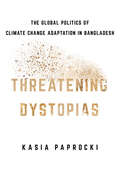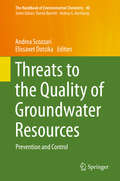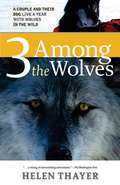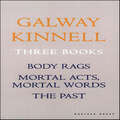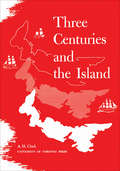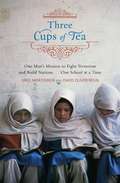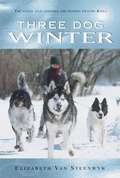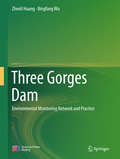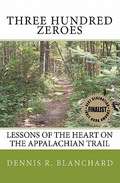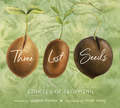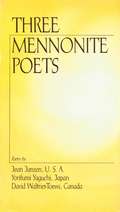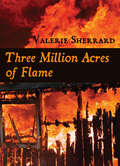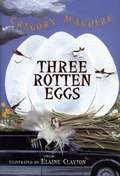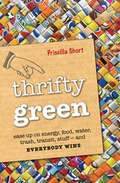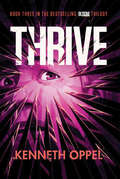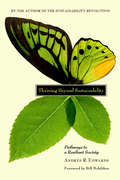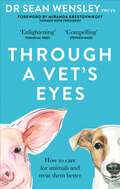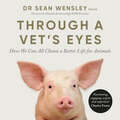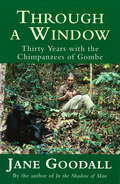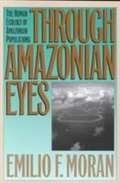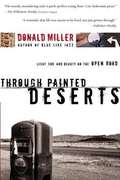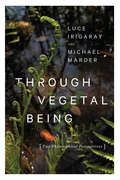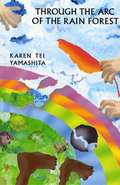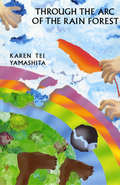- Table View
- List View
Threatening Dystopias: The Global Politics of Climate Change Adaptation in Bangladesh (Cornell Series on Land: New Perspectives on Territory, Development, and Environment)
by Kasia PaprockiBangladesh is currently ranked as one of the most climate vulnerable countries in the world. In Threatening Dystopias, Kasia Paprocki investigates the politics of climate change adaptation throughout the South Asian nation. Drawing on ethnographic and archival fieldwork, she engages with developers, policy makers, scientists, farmers, and rural migrants to show how Bangladeshi and global elites ignore the history of landscape transformation and its attendant political conflicts. Paprocki looks at how groups craft economic narratives and strategies that redistribute power and resources away from peasant communities. Although these groups claim that increased production of export commodities will reframe the threat of climate change into an opportunity for economic development and growth, the reality is not so simple. For the country's rural poor, these promises ring hollow. As development dispossesses the poor from agrarian livelihoods, outmigration from peasant communities leads to precarious existences in urban centers. And a vision of development in which urbanization and export-led growth are both desirable and inevitable is not one the land and its people can sustain. Threatening Dystopias shows how a powerful rural movement, although hampered by an all-consuming climate emergency, is seeking climate justice in Bangladesh.
Threats to the Quality of Groundwater Resources
by Andrea Scozzari Elissavet DotsikaThis book focuses on scientific and technological aspects of groundwater-resources assessment and surveillance. It describes relevant risks and investigates selected techniques for the monitoring and mitigation of the individuated threats to groundwater quality. The authors discuss the concepts of groundwater-resources protection and offer examples of both geogenic and anthropogenic degradation of groundwater quality, such as heavy metals from mining activities and natural water-rock interactions, as well as risk of contamination due to geological CO2 storage practices etc. The volume also covers non-invasive monitoring techniques and briefly addresses innovative sensor technologies for the online assessment of water quality. Furthermore, the role played by geochemical techniques, the potential of environmental isotopes and the support provided by physical modelling are highlighted. The chapters guide the reader through various viewpoints, according to the diverse disciplines involved, without aiming to be exhaustive, but instead picking representative topics for their relevance in the context of groundwater protection and control. This book will be of interest to advanced students, researchers, policy-makers and stakeholders at various levels.
Three Among the Wolves: A Couple and Their Dog Live a Year with Wolves in the Wild
by Helen ThayerHelen and Bill Thayer, accompanied by their part-wolf, mostly Husky dog, Charlie, set out to live among wild wolf packs -- first in the Canadian Yukon and then in the Arctic. When they set up camp within 100 feet of a wolf den, they were greeted with apprehension. But they establish trust over time because the wolves accept Charlie as the alpha male of the newly arrived "pack." Readers travel with the Thayers as they learn about wolf family structure, view the intricacies of the hunt, the wolves' finely honed survival skills, and playfulness.
Three Bio-Realms
by G. Bruce Doern Michael J. PrinceBiotechnology has become one of the most important issues in public policy and governance, altering the boundaries between the public and the private, the economic and the social, and further complicating the divide between what is scientifically possible and ethically preferred. Given the importance of biotechnology in shaping relations between the state, science, the economy, and the citizenry, a book that explores the Canadian biotechnology regime and its place in our democracy is timelier than ever.Three Bio-Realms provides the first integrated examination of the thirty-year story of the democratic governance of biotechnology in Canada. G. Bruce Doern and Michael J. Prince, two recognized specialists in governance innovation and social policy, look at particular 'network-based' factors that seek to promote and to regulate biotechnology inside the state as well as at broader levels. Unmatched by any other book in its historical scope and range, Three Bio-Realms is sure to be read for years to come.
Three Books: Body Rags; Mortal Acts, Mortal Words; The Past
by Galway KinnellThese three books--Body Rags, Mortal Acts, Mortal Words, and The Past--are central to the life's work of one of the masters of contemporary poetry. Published here in one volume, they include many of Galway Kinnell's best loved and most anthologized poems. In a note, Galway Kinnell comments on the numerous revisions he has made to many of the poems for this edition.
Three Centuries and the Island
by Andrew Hill ClarkThis study is one of the first in the field of historical geography to be published in Canada. Written after exhaustive research, it uses a particular approach to the study of historical agricultural geography which concentrates on the use of basic distributional evidence for the description and interpretation of the changing character of any region through any period of time. By the analysis of over 1200 maps, some of which form part of the text of the book, Professor Clark studies agriculture as the dominant economic activity of Prince Edward Island and traces with remarkable clarity through the changing patterns of land culture throughout the province.The book begins with a description of the natural geography of the Island which, despite its small size, shows surprising variety. It goes on to prove the necessity for careful consideration of the background of habit and prejudice of groups of different origin when studying the changing geographies of land use.The settlement of the Island is traced from the time it was used as a summer campground by the Micmac Indians. Details of the arrival of the first Acadians, the transfer to British rule, and the subsequent influx of Scottish, Irish, Loyalist, and English stock are given together with evidence of the effect their coming had on the agriculture of the region. One hundred and fifty-five maps and sixteen tables to illustrate the distribution of population by area and origin, changes in kind and distribution of crops, census of livestock, etc., from the early eighteenth century to the present day, and from the days when the potato was unknown as a crop through the fur-farming era.The author presents this study as part of his life-work, a programme of research on the settlement overseas in the seventeenth, eighteenth, and nineteenth centuries of the people from the British Isles. He is descended from Prince Edward Island settlers and writes of the province from a background of personal knowledge of, and affection for, the land of his forbears.
Three Cups of Tea: One Man's Mission to Fight Terrorism and Build Nations...One School at a Time
by Greg Mortenson David Oliver RelinSlamming over the so-called Karakoram "Highway" in his old Land Cruiser, taking great personal risks to seed the region that gave birth to the Taliban with schools, Mortenson goes to war with the root causes of terror every time he offers a student a chance to receive a balanced education, rather than attend an extremist madrassa. If we Americans are to learn from our mistakes, from the flailing, ineffective way we, as a nation, conducted the war on terror after the attacks of 9/11, and from the way we have failed to make our case to the great moderate mass of peace-loving people at the heart of the Muslim world, we need to listen to Greg Mortenson.
Three Dog Winter
by Elizabeth Van SteenwykSled-dog racing means everything to Scott McClure. It also helps keep his father's memory alive. Scott plans to form a new team of three sled dogs so that he can continue racing and become a champion like his dad. But life changes quickly when his mother remarries and they move from California to Montana. From the start, Scott has problems with his stepfather and his stepbrother, Brad. Scott won't let anything interfere with his dreams as he trains and races Kaylah, his Malamute, and the other dogs on the team. But Scott doesn't know the obstacles he must face.
Three Gorges Dam
by Zhenli Huang Bingfang WuThis is the first English book talking about the Three Gorges Project Eco-Environmental Monitoring System (TGPEEMS). It presents lessons learned in construction of large dam projects at home and abroad in this field, identifies existing problems before suggesting a scientific improvement plan. and, most importantly, it studies modification of the TGPEEMS to adapt it to the changing situation after the impoundment of the reservoir, and provides an essential overview of measures and progress in the ecological and environmental protection for the ongoing project. As such, it offers a valuable reference guide for both researchers and environmental decision-makers. Prof. Zhenli Huang works at the National Research Center for Sustainable Hydropower Research, China Institute of Water Resources and Hydropower Research. Prof. Bingfang Wu works at the Institute of Remote Sensing Applications, Chinese Academy of Sciences, China.
Three Hundred Zeroes: Lessons Of The Heart On The Appalachian Trail
by Dennis R. BlanchardDennis Blanchard's promise to his brother haunted him for over forty years. Finally, when there were no more excuses, he set out on the Appalachian Trail to fulfill that promise. He learned that walking in the wilderness can reconnect one with a Norman Rockwell America that at times seems long lost and forgotten. The difficulties encountered walking over 2,200 miles are easily underestimated and trouble can begin long before setting a first step on the trail. Blanchard's introspective demonstrates that bears, rattlesnakes and challenging terrain may be far less formidable than some of life's more subtle dangers.
Three Lost Seeds: Stories Of Becoming (Tilbury House Nature Book #0)
by Stephie MortonTo author Stephie Morton, nature's powerful forces are a metaphor for the hardships faced by displaced children. Kids, like seeds, thrive when given a chance. Each of the three seeds in this story—a cherry seed in the Middle East, an acacia seed in Australia, and a lotus seed in Asia—survives a difficult journey through flood, fire, or drought, then sprouts (in the case of the lotus seed, a hundred years later) and flourishes. Stephie's verses and Nicole Wong's art make a picture book to treasure.
Three Mennonite Poets
by Jean JanzenThis well-received collection features three poets who differ widely in culture and style, yet are rooted in common values. Yorifumi Yaguchi is a well-known Japanese poet and professor. Jean Janzen is a Fresno, California, poet whose work has appeared in many literary magazines, and David Waltner-Toews is a Canadian with several books to his credit. Why publish a collection of this sort? Poetry as an artistic endeavor has been scarce among Mennonite people through the centuries. This may be because of their conscious separation from the larger world, or their struggle as an immigrant people, or a general suspicion of the arts held by many members of the groups. The three poets in this collection are among the finest in the Mennonite peoplehood worldwide, today. The tension between their lives, their particular cultures, and their yearnings has resulted in poetry rich in imagery and full of conviction. What common themes might a woman from California, a man from eastern Canada, and another from Japan express? Perhaps most basic is an honesty, a bare-bones truthfulness, a disdain for pretense that threads through all the poems. There is also in each a sense of design in which the individual is part of a community -- a family, or a tribe, or a people. The cultivation of that embrace is life; the loss of it is crippling, and sometimes even death. One hears, as well, a wish for peace -- with one's spouse, one's past, with all the "beasts" that beset us, both within and without. These poems reach for justice -- for both children and Grandpas who are victims, for the misunderstood who can't defend their behavior, for those alive only in our memories who can no longer explain their actions.
Three Million Acres of Flame
by Valerie SherrardCommended for the 2009 Best Books for Kids & Teens For Skye Haverill and her family, it begins as an ordinary day. But in the annals of Canadian history, October 7, 1825, is the date of one of our greatest national disasters. The Haverill family has been turned upside down in the last year. Following the death of their mother, Skye and her brother, Tavish, have adjusted to live with a single parent. And when they’re asked to make another adjustment – when his father remarries and his new wife becomes pregnant – Skye finds that some changes are too much to handle. But family struggles quickly become irrelevant when the Haverills and their community are caught up in the Miramichi Fire, the largest land fire in North American history. As the family and the town struggle through the fire and the devastating aftermath, all must find a way to rebuild homes and relationships.
Three Rotten Eggs (Hamlet Chronicles #5)
by Gregory MaguireThe students of Miss Earth's class in rural Vermont experience an eventful spring when they become involved with a bullying new student, a competitive egg hunt, and genetically altered chicks.
Thrifty Green: Ease Up on Energy, Food, Water, Trash, Transit, Stuff—and Everybody Wins
by Priscilla ShortHow one woman&’s year living off the grid made her think about conservation in a whole new way—and how to apply what she learned to your own lifestyle. Priscilla Short lived off the grid for a year in a strawbale house in Taos, New Mexico, with no electricity, no running water, and a wood-burning stove for heat. At the end of the year, Short returned home to Denver committed to making a smaller ecological footprint by consuming less and conserving more. In Thrifty Green, Short offers a unique, resource-by-resource approach that shows us that the best way to practice conservation, the real win-win, involves saving money as we lighten up. This book will help you make crucial decisions about transportation, heat, power, light, water, food, and garbage. Peppered with examples of people living both on and off the grid, eccentric and ordinary, who are deliberately making choices to live with less, Thrifty Green is much more than a how-to book. It is a conscientious guide to the art of going green that includes a wealth of terrific tips, fun facts, and straightforward strategies that will make you think about conservation in a whole new way.
Thrive: A Novel (The Bloom Trilogy #3)
by Kenneth OppelThe thrilling conclusion to internationally bestselling author Kenneth Oppel’s epic Bloom trilogy First, the aliens’ plant life bloomed, then their terrifying creatures hatched and now the aliens themselves have arrived on Earth for a final showdown. Alien-hybrids Anaya, Petra and Seth will have to push themselves further than they ever thought possible if they want to forge an alliance with the alien rebels that will allow their planet to thrive once and for all. This conclusion to the nationally bestselling Bloom trilogy will leave readers on the edge of their seats as they race to finish an adventure the Wall Street Journal called “so exciting that the pages might well have been printed with adrenaline.”
Thriving Beyond Sustainability
by Andres R. Edwards Bill MckibbenEvery fifteen seconds on our Earth, a child dies from waterborne disease. Three times an hour, another species becomes extinct. Each day we consume eighty-five million barrels of oil and pump twenty-three million tons of carbon dioxide into an already warming atmosphere. But against this bleak backdrop, beacons of hope shine from thousands of large and small initiatives taking place everywhere from isolated villages to major urban centers.Thriving Beyond Sustainability draws a collective map of individuals, organizations, and communities from around the world that are committed to building an alternative future--one that strives to restore ecological health; reinvent outmoded institutions; and rejuvenate our environmental, social, and economic systems. The projects and initiatives profiled are meeting the challenges of the day with optimism, hope, and results, leading the way in: Relocalization Green commerce Ecological design Environmental conservation Social transformation Overflowing with inspiration, the stories and ideas in these pages will cause the most chronic pessimist to see the glass as half full--to move beyond a perception of surviving with scarcity to one of flourishing with abundance. The comprehensive resource section provides the tools for everyone to become a catalyst for change.Andres R. Edwards is the author of The Sustainability Revolution, which has sold over twenty thousand copies. He is an educator, media designer, LEED-accredited green building and sustainability consultant, and the founder of EduTracks, a firm specializing in developing education programs and providing consulting services on sustainable practices.
Through A Vet’s Eyes: How we can all choose a better life for animals
by Dr Dr Sean Wensley FRCVS'A compelling account of the trials, tribulations and triumphs of life as a vet - and a lesson to us all on how we should treat the animals with which we share our lives.' - Stephen Moss, naturalist and authorDr Sean Wensley is an award-winning vet and lifelong naturalist who has contributed to animal welfare and conservation projects all over the world. His debut book is about how we can choose a better life for animals, from the chickens we eat to the pets we keep.As our societies become more urbanised, we are further removed from the reality of where and how our food is produced. Surveys suggest that nearly 1 in 4 UK adults don't know that bacon comes from pigs. On the opposite end of the spectrum, the humanisation of our pets is a risk to their welfare; with over 60% of UK dogs being overweight or obese, we are effectively killing them with kindness. Through A Vet's Eyes seeks to redress this imbalance so that we see all animals as thinking, feeling beings not dissimilar to ourselves. As he takes us through the years in which he trained to become a vet, and set against a backdrop of inspiring natural spectacles, Dr Wensley shares his first-hand experience of how animals are treated and used for our benefit. He interrogates the different levels of welfare afforded to them and reveals how we the general consumer can reduce our animal welfare footprint through the choices we make every day.
Through A Vet’s Eyes: How we can all choose a better life for animals
by Dr Sean Wensley FRCVSOne of the Financial Times' Best Summer Books of 2022 A vet's eye-opening polemic about our relationship with animals; how we treat them, what it feels like from their perspective, how we get it wrong and what we can do to fix it.Dr Sean Wensley is an award-winning vet and lifelong naturalist who has contributed to animal welfare and conservation projects all over the world. His debut book is about how we can choose a better life for animals, from the chickens we eat to the pets we keep.As our societies become more urbanised, we are further removed from the reality of where and how our food is produced. Reported surveys have suggested that 1 in 4 UK adults don't know that bacon comes from pigs. On the opposite end of the spectrum, the humanisation of our pets is a risk to their welfare; with over 60% of UK dogs being overweight or obese, we are effectively killing them with kindness. Through A Vet's Eyes seeks to redress this imbalance so that we see all animals as thinking, feeling beings not dissimilar to ourselves. As he takes us through the years in which he trained to become a vet, and set against a backdrop of inspiring natural spectacles, Dr Wensley shares his first-hand experience of how animals are treated and used for our benefit. He interrogates the different levels of welfare afforded to them and reveals how we the general consumer can reduce our animal welfare footprint through the choices we make every day.(P) Octopus Publishing Group 2022
Through A Window: My Thirty Years With The Chimpanzees Of Gombe
by Jane GoodallFrom the world-famous expert on chimpanzees - the powerfully compelling sequel to the international bestseller IN THE SHADOW OF MAN: 'An instant animal classic' TimeEquipped with little more than a notebook, binoculars, and her fascination with wildlife, Jane braved a realm of unknowns to give the world a remarkable window into humankind's closest living relatives. On the shores of Lake Tanganyika, Gombe is a community where the principal residents are chimpanzees. Through Goodall's eyes we watch as the younger chimpanzees vie for power, and how the leaders must deal with this challenge. We learn how one mother successfully rears her children, whilst another appears to doom her offspring to failure. All life is here - glorious births and heart-breaking deaths, moments of brutality, alongside the most tender displays of affection.In THROUGH A WINDOW, as Jane Goodall reveals the story of this intimately intertwined community, we are shown the parallels with human emotions laid bare. Indeed, in the mirror of chimpanzee life, we see ourselves reflected.
Through Amazonian Eyes: The Human Ecology of Amazonian Populations
by Emilio MoranIn the final years of the twentieth century we live with omnipresent worries. Will the Amazonian forests survive current deforestation trends? Will Amazonia's native populations survive the spread of diseases and the expropriation of traditional territories? Will the promise of biotechnology ever be fulfilled, given the genetic losses we are experiencing? Will scientists find new chemical substances in the forests of Amazonia to cure diseases heretofore incurable or yet unknown? Will we learn to use, rather than thoughtlessly destroy, the thousands of tropical species that we now consider without value? Will we invest in agronomic research to find ways to achieve sustainable cultivation in the humid tropics? In June 1992, at the Earth Summit in Rio de Janeiro, the world was finally ready to ask these questions.
Through Painted Deserts
by Donald MillerBelieving that something better exists than the mundane life, this is a memoir of two free spirits who set off on an adventure-filled road trip in search of deeper meaning, beauty, and an explanation for life. Many young men dream of such a trip, but few are brave enough to actually attempt it. Miller records the trip with wide-eyed honesty in achingly beautiful prose also discussing everything from the nature of friendship, the reason for pain, and the origins of beauty.
Through Vegetal Being: Two Philosophical Perspectives (Critical Life Studies)
by Luce Irigaray Michael MarderBlossoming from a correspondence between Luce Irigaray and Michael Marder, Through Vegetal Being is an intense personal, philosophical, and political meditation on the significance of the vegetal for our lives, our ways of thinking, and our relations with human and nonhuman beings. The vegetal world has the potential to rescue our planet and our species and offers us a way to abandon past metaphysics without falling into nihilism. Luce Irigaray has argued in her philosophical work that living and coexisting are deficient unless we recognize sexuate difference as a crucial dimension of our existence. Michael Marder believes the same is true for vegetal difference.Irigaray and Marder consider how plants contribute to human development by sustaining our breathing, nourishing our senses, and keeping our bodies and minds alive. They note the importance of returning to ancient Greek tradition and engaging with Eastern teachings to revive a culture closer to nature. As a result, we can reestablish roots when we are displaced and recover the vital energy we need to improve our sensibility and relation to others. This generative discussion points toward a more universal way of becoming human that is embedded in the vegetal world.
Through the Arc of the Rain Forest
by Karen T. YamashitaThrough the Arc of the Rain Forest is a burlesque of comic-strip adventures and apocalyptic portents that stretches familiar truths to their logical extreme in a future world that is just recognizable enough to be frightening. In the Author's Note," Karen Tei Yamashita writes that her book is like a Brazilian soap opera called a novela: "the novela's story is completely changeable according to the whims of the public psyche and approval, although most likely, the unhappy find happiness; the bad are punished; true love reigns; a popular actor is saved from death ... an idyll striking innocence, boundless nostalgia and terrible ruthlessness." The stage is a vast, mysterious field of impenetrable plastic in the Brazilian rain forest set against a backdrop of rampant environmental destruction, commercialization, poverty, and religious rapture. Through the Arc of the Rainforest is narrated by a small satellite hovering permanently around the head of an innocent character named Kazumasa. Through no fault of his own, Kazumasa seems to draw strange and significant people into his orbit and to find himself at the center of cataclysmic events that involve carrier pigeons, religious pilgrims, industrial espionage, magic feathers, big money, miracles, epidemics, true love, and the virtual end of the world. This book is simultaneously entertaining and depressing, with all the rollicking pessimism you'd expect of a good soap opera or a good political satire."- Kirsten Backstrom, 500 Great Books by Women
Through the Arc of the Rain Forest
by Karen Tei YamashitaThrough the Arc of the Rain Forest is a burlesque of comic-strip adventures and apocalyptic portents that stretches familiar truths to their logical extreme in a future world that is just recognizable enough to be frightening. In the Author's Note," Karen Tei Yamashita writes that her book is like a Brazilian soap opera called a novela: "the novela's story is completely changeable according to the whims of the public psyche and approval, although most likely, the unhappy find happiness; the bad are punished; true love reigns; a popular actor is saved from death ... an idyll striking innocence, boundless nostalgia and terrible ruthlessness." The stage is a vast, mysterious field of impenetrable plastic in the Brazilian rain forest set against a backdrop of rampant environmental destruction, commercialization, poverty, and religious rapture. Through the Arc of the Rainforest is narrated by a small satellite hovering permanently around the head of an innocent character named Kazumasa. Through no fault of his own, Kazumasa seems to draw strange and significant people into his orbit and to find himself at the center of cataclysmic events that involve carrier pigeons, religious pilgrims, industrial espionage, magic feathers, big money, miracles, epidemics, true love, and the virtual end of the world. This book is simultaneously entertaining and depressing, with all the rollicking pessimism you'd expect of a good soap opera or a good political satire."- Kirsten Backstrom, 500 Great Books by Women
